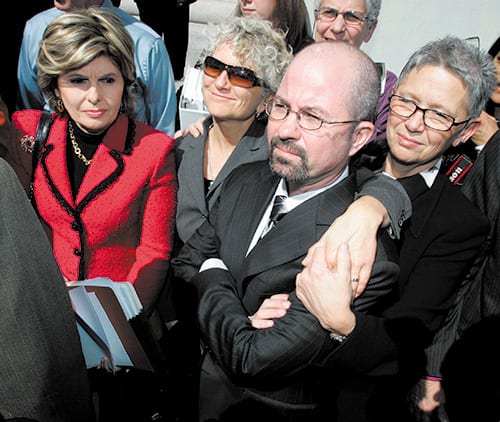The Texas Supreme Court tries to roll back advances made in Obergefell by denying the expansiveness of the ruling

David Taffet | Senior Staff Writer
taffet@dallasvoice.com
An attorney with the ACLU of Texas contacted Dallas Voice with information on the appeals process for this case shortly after we had to go to press on Thursday. Find that information here.
Four days after the U.S. Supreme Court handed down a decision advancing LGBT family rights, and after two years of marriage equality in Texas have resulted in thousands of married same-sex couples, the Texas Supreme Court on June 30 ruled those couples don’t necessarily have a right to the same marriage benefits as opposite-sex couples.
On June 26, the U.S. Supreme Court summarily overturned an Arkansas law dealing with who can be listed as a parent on a birth certificate. The decision in the case, known as Pavan v. Smith, opens with an explanation of the 2015 Obergefell ruling: “The Constitution entitles same-sex couples to civil marriage ‘on the same terms and conditions as opposite-sex couples.’”
Four days later, the Texas Supreme Court mentioned Pavan in its ruling, but ignored what the ruling said, ignored the Obergefell ruling and, instead, concentrated on and dismissed the Texas marriage equality case, DeLeon v. Perry.
In its Pidgeon v. Turner ruling, the Texas Court wrote, “5th Circuit decisions are not binding on Texas courts” and “they are obligated to follow only higher Texas courts and the United States Supreme Court.” The 5th Circuit heard arguments in DeLeon but had not issued any ruling before the U.S. Supreme Court issued its Obergefell decision.
The Pavan ruling stated that if a non-biological opposite-sex spouse would automatically be placed on a birth certificate, a non-biological same-sex spouse should also be placed on their child’s birth certificate.
The Texas court uses SCOTUS’ review of the case to argue that it’s an example of “an issue it did not address in Obergefell.” But the Texas court ignored that the U.S. Supreme Court, in its ruling, told the Arkansas Supreme Court that this matter was already settled law, as per the Obergefell ruling.
The Texas court then ignored Obergefell, which actually went into detail explaining that although marriage was historically between a man and a woman, marriage has always evolved, and today it isn’t what it was in the past.
Pidgeon questions whether Obergefell meant anything more than states must issue a license, ignoring the U.S. Supreme Court’s instruction that all marriages are entitled to the same “rights, benefits, and responsibilities.”
After dismissing the U.S. Supreme Court’s actual words in the two cases, the Texas court concentrated on the appeals court’s actions that it claims it doesn’t need to follow. The Texas court explained that the 5th Circuit only upheld a lower federal court ruling after Obergefell. But even if they’re bothered by the 5th Circuit’s failure to issue an actual ruling, they claim they wouldn’t be bound by it anyway.
“The Supreme Court held in Obergefell that the Constitution requires states to license and recognize same-sex marriages to the same extent that they license and recognize opposite-sex marriages, but it did not hold that states must provide the same publicly funded benefits to all married persons, and — unlike the 5th Circuit in De Leon — it did not hold that the Texas DOMAs are unconstitutional,” the Texas Supreme Court wrote.
After the Obergefell ruling, the 5th Circuit affirmed the decision of the lower court, which ruled in favor of equality, agreeing with the U.S. Supreme Court. But in its decision, the Texas Supreme Court declared the only federal court that has jurisdiction over it is the U.S. Supreme Court, so DeLeon was irrelevant.
Background
Pidgeon v. Turner originated in 2013 and was then known as Pidgeon v. Parker, after the Windsor decision invalidated part of the Defense of Marriage Act. Then-Houston Mayor Annise Parker, on advice from the city attorney, extended marriage benefits to same-sex couples who had married in other states or countries.
A month later, two Houston residents, Jack Pidgeon and Larry Hicks, filed suit and got an injunction claiming those benefits violated the Texas Constitution and the Texas Family Code. That injunction was lifted after the Obergefell decision in 2015, and Houston began offering equal benefits to city employees.
Once benefits were offered, the Houston plaintiffs asked the Texas Supreme Court to hear the case. The court refused at first, but after receiving amicus briefs from Gov. Greg Abbott, Lt. Gov. Dan Patrick and Attorney General Ken Paxton, the court reversed its course and agreed to hear the case.
After Parker left office, her successor Sylvester Turner left her nondiscrimination policies in place, and Pidgeon and Hicks continued their lawsuit against Houston and the new mayor.
The effect of the ruling
Shannon Minter is the legal director of the National Center for Lesbian Rights, which argued Pavan in the U.S. Supreme Court and won.
“You don’t expect a court to rule that way,” Minter said about the Texas court ruling. “There is a U.S. Supreme Court precedent — ‘We told you this already.’”
He said what stands out in this case is the Texas court’s pretense that there’s an open question or uncertainly. “Pavan laid that to rest,” he said. “It’s an inexcusable error.”
Minter called this more than just a bad ruling that would be overturned. He said it was very disturbing that a state supreme court would fail to follow law as set by the U.S. Supreme Court. He said he could think of no examples of the high court of any state making a similar ruling on abortion rights and had to go back as far as Brown v. Board of Education in the early 1950s, when state courts tried to block implementation of integration, to find anything similar.
During that period, Texas courts refused to enforce Brown on the premise that no Texas laws had been challenged. But the Texas Supreme Court ruled the cases were “so utterly without merit that we overrule it without further discussion.”
In the current case, the Texas Supreme Court even mentions its own decision regarding Brown — and then ignores it.
“It’s shocking, shameful and [it] undermines the integrity of our political system,” Minter said. “We rely on our courts to play by the rules.”
He said when the Arkansas Supreme Court agreed with the state and tried to prevent a same-sex parent from appearing on her child’s birth certificate, the ruling was summarily reversed in Pavan. That ruling reiterates that Obergefell makes it clear the U.S. Supreme Court was not interested in hearing cases about the rights of same-sex couples benefit by benefit.
That the Texas court ruled just a mere four days after Pavan, Minter said, makes this ruling “unconscionable.” The ruling, he said, “sets a dangerous precedent that should be of concern to every person in the state.”
Mary Bonauto, the attorney who argued Obergefell in front of the U.S. Supreme Court issued a statement that agreed: “The U.S. Supreme Court in Obergefell unambiguously recognized the fundamental and equal right to marry for same-sex couples nationwide, together with access to all the same legal rights, benefits and responsibilities associated with marriage without discrimination — a recognition the court, in fact, just re-affirmed this week in Pavan v. Smith,” Bonauto wrote. “For the Texas court to leave open the possibility that Obergefell could be read otherwise is, plainly, wrong.”
Stonewall Democrats of Dallas President Lee Daugherty called Abbott, Patrick and Paxton’s interference “highly inappropriate.”
“These Republicans are using their offices’ power to coerce the Texas Supreme Court to further their own religiously motivated and openly bigoted agendas,” he said.
He encouraged the city of Houston to appeal the decision directly to the U.S. Supreme Court.
Pidgeon and Hicks’ attorney, Jared Woodfill, on the other hand, told Texas Monthly he would also like the case to go to the U.S. Supreme Court, but he hopes it’s a vehicle for overturning Obergefell.
Dallas Voice reached out to attorneys for the city of Houston for comment but as of press deadline, had not heard back from them.
……………………

National Center for Lesbian Rights Shannon Minter, second from right, shown here with attorney Gloria Allred and California marriage equality plaintiffs Pali Cooper and Jeanne Rizzo in 2008, called the Texas Supreme Court’s June 30th decision shocking and shameful.
(Jose Sanchez/Associated Press)
This article appeared in the Dallas Voice print edition July 7, 2017.















